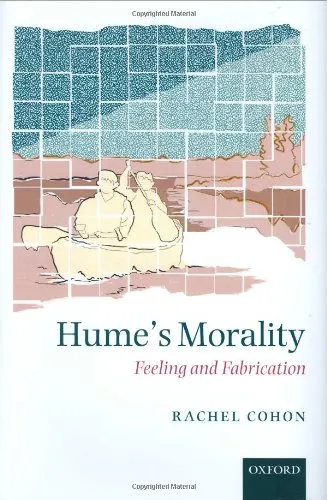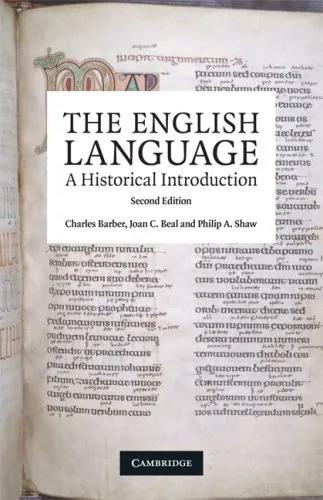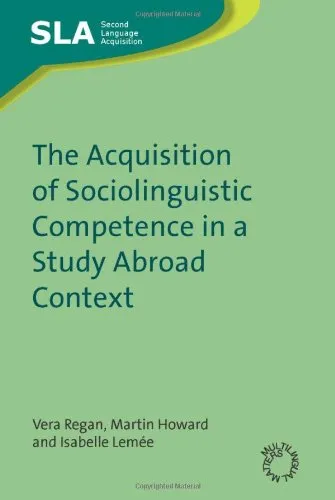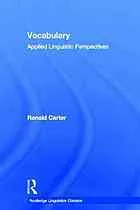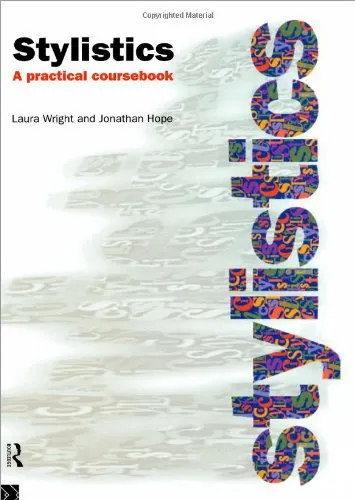Hume's Morality: Feeling and Fabrication
4.5
بر اساس نظر کاربران

شما میتونید سوالاتتون در باره کتاب رو از هوش مصنوعیش بعد از ورود بپرسید
هر دانلود یا پرسش از هوش مصنوعی 2 امتیاز لازم دارد، برای بدست آوردن امتیاز رایگان، به صفحه ی راهنمای امتیازات سر بزنید و یک سری کار ارزشمند انجام بدینکتاب های مرتبط:
معرفی کتاب 'Hume's Morality: Feeling and Fabrication'
کتاب 'Hume's Morality: Feeling and Fabrication' اثری است از ریچل کوهن که به بررسی عمیق فلسفه اخلاق دیوید هیوم میپردازد. این کتاب تلاش میکند تا احساسات، ارزشها و مبانی اخلاقی را که در اندیشه هیوم نهفته است تحلیل کند و نشان دهد که چگونه این نظریات در توسعه فلسفه اخلاق معاصر نقشآفرینی کردهاند.
خلاصهای جامع از محتوا
این اثر جامعهشناسی و فلسفه اخلاق را به هم پیوند میدهد تا دیدگاه هیوم را در مورد منشاء و عملکرد اخلاق توضیح دهد. بهطور خاص، کوهن بر این باور است که احساسات اساس اخلاقی هستند و هیوم بهجای تمرکز بر عقلانیت، به اهمیت عواطف و احساسات انسانی در پایهگذاری اصول اخلاقی اشاره میکند. این کتاب به طور متمرکز، تمایزی که هیوم بین natural virtues و artificial virtues قائل میشود بررسی میکند، و به تبیین اینکه چگونه این تمایز فلسفی درک ما از رفتارها و وظایف اخلاقی را عمیقتر میکند، میپردازد.
همچنین، اثر کوهن توضیح میدهد که چگونه هیوم مفهومی از اخلاق را ارائه میدهد که در تعامل با جامعه و تاریخ شکل میگیرد و اینکه این دیدگاه چگونه باعث میشود تا اخلاق را به عنوان یک "ساختار اجتماعی" تلقی کنیم. در طول مطالعه، نویسنده روابط بین هیوم و دیگر فیلسوفان همچون کانت را بررسی کرده و نقاط تفاوت و شباهتهای فکری را آشکار میکند.
نکات کلیدی
- تفاوت بین natural virtues مانند مهربانی و artificial virtues مانند عدالت و تأثیر آنها بر جامعات انسانی.
- نقش احساسات در شکلدهی قضاوتهای اخلاقی و نحوه عملکرد آنها در زندگی روزمره انسانها.
- بررسی انتقادی ایدههای هیوم در رابطه با اخلاق بهعنوان محصولی از تعامل اجتماعی و تاریخی.
- بحثهای فلسفی مرتبط میان هیوم و فیلسوفان معاصر و پس از او همچون کانت، اسمیت و غیره.
جملات معروف کتاب
اخلاق نه محصول منطق بلکه زاییده احساسات انسانی است که قواعد رفتار ما را شکل میدهند.
هیوم باور دارد که اصول اخلاقی عمدتاً متاثر از توافقات اجتماعی و تاریخ هستند، نه قوانین ثابت طبیعت.
چرا این کتاب مهم است؟
این کتاب درک ما از فلسفه اخلاق را متحول میکند و نشان میدهد که چگونه هیوم با تمرکز بر احساسات، نگاه تازهای به منشاء اخلاق ارائه میدهد. 'Hume's Morality: Feeling and Fabrication' مرجع مهمی برای محققان، دانشجویان و علاقهمندان به فلسفه است که به دنبال درکی عمیقتر از دیدگاه هیوم درباره اخلاق هستند.
اثر ریچل کوهن کمک میکند تا تفاوت میان رویکردهای کلاسیک به اخلاق، نظیر تاکید بر قوانین و اصول ثابت، و دیدگاههای مبتنی بر احساسات و اجتماع بهتر درک شود. به همین دلیل، این کتاب در تاریخ فلسفه و مطالعات اخلاقی جایگاه ویژهای دارد.
Introduction to "Hume's Morality: Feeling and Fabrication"
David Hume, one of the most important figures in the history of philosophy, is renowned for his compelling exploration of morality, reason, and human nature. In Hume's Morality: Feeling and Fabrication, I, Rachel Cohon, delve deeply into Hume's ethical philosophy to address how his distinctly empirical and naturalist view of morality is constructed. This book carefully dissects Hume’s ideas, presenting a nuanced interpretation that connects his perspectives on human feeling, moral sentiment, and the role of fabrication in systematizing morality. It invites scholars, students, and philosophers alike to rethink how Hume’s moral philosophy is understood and its relevance in contemporary moral discourse.
Through an intensive analysis of Humean morality, the book uncovers the unique interplay between feeling—rooted in human sentiment—and rational fabrication, where systems of ethics are crafted. Such an investigation not only provides a clearer picture of Hume's philosophy but also spotlights its enduring significance in modern thought.
Detailed Summary of the Book
The central premise of Hume's Morality: Feeling and Fabrication can be summarized as exploring two key aspects of David Hume’s moral philosophy: feelings, which are the natural expressions of human sentiment, and fabrication, where humans construct moral systems for social navigation and cohesion. Hume suggests that morality is not a product of abstract reasoning but fuelled instead by our emotional responses, underpinned by natural human sympathies.
The first part of the book examines how Hume defends the claim that moral good and evil are founded on human feelings rather than objective truths or divine commandments. Drawing from his empirical philosophy, I argue that morality is an extension of human nature, where sentiments such as empathy, approval, and disapproval define our moral experiences. The book sheds light on Hume’s famous assertion that “reason is, and ought only to be, the slave of the passions,” offering both an explanation and a defense of this claim.
The second part introduces the concept of "fabrication" in Hume's moral philosophy. While moral sentiments arise naturally, the systems of morality—codes, rules, and conventions—are shaped through a communal effort. These systems of morals are refined and fabricated to address practical concerns, regulate behavior, and enhance social harmony. I explore how this fabrication process retains its grounding in sentiment but gains coherence and structure as systems evolve.
Finally, I connect Hume’s moral theory to the broader question of the purpose and practical advantages of morality. Hume's naturalistic and empirical approach to ethics makes his philosophy uniquely equipped to address contemporary moral questions across intercultural, scientific, and philosophical debates.
Key Takeaways
- Hume’s moral philosophy is founded on sentiment rather than abstract reason, emphasizing the emotional basis of moral distinctions.
- The concept of "fabrication" explains how structured moral systems are created collectively to serve human interests and improve social interaction.
- Morality, for Hume, is deeply rooted in human nature, and thus it is universal yet adaptable across cultural and social contexts.
- Hume's insights highlight the practical advantages of morality as a tool for promoting cooperation, stability, and happiness within societies.
- His pioneering work on moral sentiments paves the way for subsequent thinkers in moral psychology and ethics, making his philosophy highly influential to modern-day debates.
Famous Quotes from the Book
"Reason alone can never be a motive to any action of the will, nor can it oppose the preference of any passion or emotion."
"Human nature is the only basis of ethics; our moral codes and structures must be built upon the sentiments we naturally have."
"Fabrication of morality does not erode its authenticity; it enhances its utility and coherence."
Why This Book Matters
Hume’s moral philosophy has long been admired for its groundbreaking approach, but the intricacies of his ideas are still subject to much debate. Hume's Morality: Feeling and Fabrication brings clarity to these debates by addressing the critical relationship between sentiment and systematized morality. This book matters because it provides a thorough, accessible, and innovative interpretation of Hume’s ethical thought, making it indispensable for scholars of philosophy and anyone interested in the origins and structure of moral systems.
Moreover, the book bridges historical philosophical inquiry with contemporary concerns. It illustrates how Hume’s moral philosophy applies to present-day issues, from moral relativism to the development of ethical AI. In doing so, it reinforces the timeless relevance of Hume’s ideas in our increasingly complex and interconnected world.
By emphasizing the naturalistic basis for ethics while showing how human ingenuity refines morality into practical systems, this book offers a fresh perspective on ethics and provides tools for engaging with pressing questions about how humans behave and judge right from wrong.
دانلود رایگان مستقیم
شما میتونید سوالاتتون در باره کتاب رو از هوش مصنوعیش بعد از ورود بپرسید
دسترسی به کتابها از طریق پلتفرمهای قانونی و کتابخانههای عمومی نه تنها از حقوق نویسندگان و ناشران حمایت میکند، بلکه به پایداری فرهنگ کتابخوانی نیز کمک میرساند. پیش از دانلود، لحظهای به بررسی این گزینهها فکر کنید.
این کتاب رو در پلتفرم های دیگه ببینید
WorldCat به شما کمک میکنه تا کتاب ها رو در کتابخانه های سراسر دنیا پیدا کنید
امتیازها، نظرات تخصصی و صحبت ها درباره کتاب را در Goodreads ببینید
کتابهای کمیاب یا دست دوم را در AbeBooks پیدا کنید و بخرید
1271
بازدید4.5
امتیاز0
نظر98%
رضایتنظرات:
4.5
بر اساس 0 نظر کاربران
Questions & Answers
Ask questions about this book or help others by answering
No questions yet. Be the first to ask!
